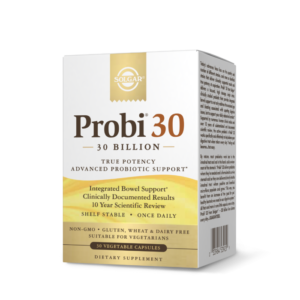Key Takeaways:
- 70% of immune cells are housed in the gut. The lining of the digestive system where immune cells are housed helps filter nutrients and keep toxins from entering the bloodstream.
- Taking supplements, eating a balanced diet, exercising, and drinking water can help support a healthy immune and digestive system.
You’ve probably heard the saying, “everything is connected.” When it comes to the body, this is especially true. The health of one part of the body supports the health of others, and an illness or malfunction in one area can affect the function of other areas.
The digestive system and the immune system have a specifically unique relationship. In fact, 70% of your immune system is housed in your gut.
Keep reading to learn more about how the immune system and the digestive system are connected and how you can support immune and digestive health!
The immune system in the gut
The digestive system is the main channel between the external environment and the internal systems of the body. Think about it — every day, you consume food from the world around you, which is processed and used by your body. And while you may know it is safe for you to eat, your body needs to have a process of ensuring that this food will not cause your body harm.
As mentioned earlier, 70% of immune cells are located in the digestive system, specifically in the form of gut-associated lymphoid tissue (GALT). The GALT includes small lymph nodes found in the small intestine called Peyer’s patches, which are responsible for taking up antigens and delivering them to antigen-presenting cells, and activating T and B cells, macrophages, and more.1
Your body has two types of immune systems: the innate immune system and the adaptive immune system. The innate, or nonspecific immune system, is the one with which you were born. Much of the innate immune system is located in the small intestine — which is where water and nutrients are also absorbed from the food that you eat. The innate immune system in the small intestine plays a central role in defense against undesirable microbes.2 The adaptive immune system is known as the acquired immune system and adapts to those pathogens you come into contact with throughout your life.
How gut bacteria affects the immune system
In the same way that your immune system affects your digestive system, your gut also affects your immune system. As we know, 70% of the body’s immune cells are found in the digestive system.
Additionally, your gut contains a microbiome made up of good bacteria that live in your body naturally and some help with the breakdown of food.
The diversity of the microbiome in the gut influences the strength and development of the immune system. Throughout life, other factors also shape the composition of your microbiome, such as diet, environment, and lifestyle habits.
The good bacteria in your gastrointestinal tract also help contribute to a strong immune system by communicating with and “training” immune cells to react to undesirable microbes in a balanced way.
An imbalance in the microflora in the gut can potentially upset the relationship between the gut microbiome and the immune system which can alter immune responses.
Supporting digestive health
1. Take a probiotic
Probiotics can help balance the friendly bacteria in your digestive system, leading to less occasional gas and bloating.*
Solgar® Probi® 20 Billion helps deliver potent and effective support to your digestive system.* Each serving offers 20 billion live cultures to your gut and is gluten and dairy-free.
Solgar® Probi® 30 Billion helps maintain good gut and bowel health by offering 30 billion live cultures in just one capsule.* Both Solgar® Probi® 20 Billion and Solgar® Probi® 30 Billion have undergone ten years of scientific review so that you can rest assured you’re giving your digestive system the best.
Solgar® Advanced Multi-Billion Dophilus® is a source of L. acidophilus, B. lactis, L. paracasei and L. rhamnosus, beneficial microorganisms that help maintain a healthy intestinal flora.* This product is formulated with the well-known strains LA-5®, BB-12®, L. casei 431® and LGG® and promotes the healthy functioning of the intestinal system.*
2. Eat lots of fiber
It’s no secret that fiber is good for digestive health. Soluble fiber absorbs water and helps add bulk to your stool. Insoluble fiber acts like a toothbrush, helping your digestive tract keep everything moving along. Fermentable fibers also feed the friendly bacteria in your digestive tract. Eating a balanced diet with many fiber-rich foods such as legumes, avocado, oats, or chia seeds can help keep your digestive system working optimally.
3. Drink lots of water
Low fluid intake is a common cause of constipation. Water and other fluids help break down food so that your body can absorb the nutrients and also helps soften your stool to prevent constipation.
Note: Drinking water is also crucial for immune health! Staying hydrated is important for detoxification pathways, increasing lymphatic draining, and making sure you are clearing out any foreign invaders or other waste materials.
Supporting immune health
Taking care of your immune system can also help support a healthy digestive system. Let’s take a look at a few ways you can maintain immune health.
1. Take an immune-supporting supplement
Vitamin C, vitamin D, zinc, and other vitamins and minerals are essential for maintaining a healthy immune system.* Taking a premium supplement is an easy way to help you get adequate amounts of these vitamins and minerals.
Solgar® Vitamin D3 helps support a healthy immune system and promote calcium absorption for strong bones and teeth.* It’s also non-GMO, gluten-free, dairy-free, and kosher.
Solgar® Chelated Zinc helps support a healthy immune system, as well as healthy skin, eyes, and reproductive functions.* Our premium formula provides zinc in a highly absorbable, chelated form of zinc which is gentle on the stomach.* And, it’s non-GMO, vegan, gluten-free, dairy-free, and kosher!
Solgar® Ester-C Plus Immune Complex Softgels feature Ester-C, a non-acidic, gentle version of vitamin C that stays in white blood cells for up to 24 hours.* This unique formula also includes vitamin D3 and zinc for added immune support, as well as elderberry, echinacea, and astragalus.* The softgel form offers quick absorption. And, it’s non-GMO, gluten-free, and dairy-free.
2. Eat immune-supporting foods
Eating a balanced diet affects all areas of your body, including your immune and digestive systems. Make sure you are consuming enough vitamin C-rich foods, such as citrus fruits, spinach, or bell peppers. Or, to make it easier, take a vitamin C supplement every day such as Solgar® Ester-C.
3. Exercise regularly
Whether you enjoy running, swimming, or working in your garden — there is no wrong exercise! During and after exercise pro- and anti-inflammatory cytokines are released, and immune-cell circulation improves, leading to increased immune support.2
4. Get adequate sleep
Skipping out on sleep does more than make you feel groggy the next day, it can also prevent your immune system from working optimally. Getting eight to ten hours of sleep each night can help promote overall health.
Summing it up
When your immune system is healthy, your gut microbiome and immune system maintain balance in the body. A healthy digestive system can also lead to a healthy immune system and vice versa. Prioritizing your immune health and digestive health by taking supplements, eating well, and staying hydrated can lead to positive overall well-being.
At Solgar®, we have over three hundred unique products. Learn more about them by following us on Instagram!
*These statements have not been evaluated by the Food and Drug Administration. These products are not intended to diagnose, treat, cure or prevent any disease.
The information provided on this site is intended for your general knowledge only and is not a substitute for professional medical advice or treatment for specific medical conditions. Always seek the advice of your physician or other qualified healthcare provider with any questions you may have regarding a medical condition. The information on this website is not intended to diagnose, treat, cure or prevent any disease. Never disregard medical advice or delay in seeking it because of something you have read on the Solgar® site.





